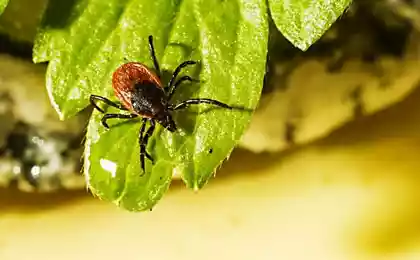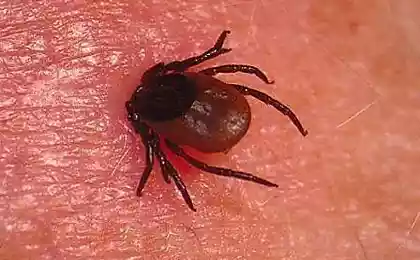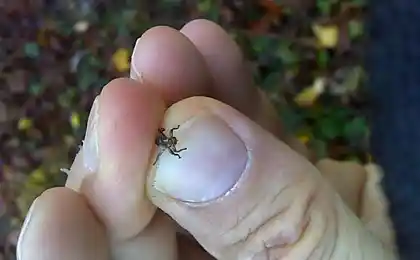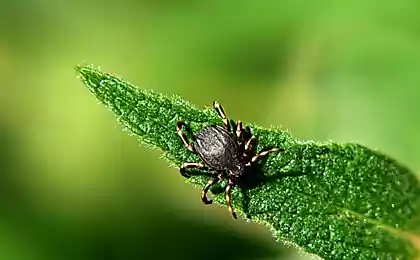633
Ticks. Know your enemy in the face!
In the comments to yesterday's post on the Viper, a few of our members are also asked to tell about crawling troubles, the bite of which is insured unfortunately none of us - mites. Well said - done! We offer you some important tips, what to do if you are bitten by this infection. Of course these tips are unlikely to be useful to seasoned web and mushroom hunters, but beginners are very welcome.
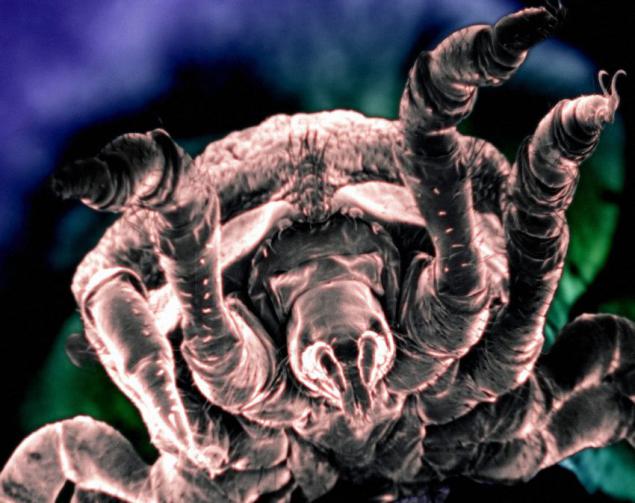
Ticks do not climb trees and jump out of the grass.
The most common ticks bite a man in the forest - where they actually live.
The mite can crawl on you from the grass or shrubs, but do not jump from the tree because ticks can not jump. Usually, they do not rise above 1, 5 m above the ground. The legs are very tenacious insects, arachnids and themselves - are very small, so you do not even feel that someone crawling through your body. Of course, avoid contact with ticks can help tight-fitting clothes, but only rely on is not worth it. Usually mites bite in the softest place on the body - armpits, groin area or behind the ears. Therefore, walking through the woods, often examine themselves and friends.
Do not forget that you can pick up the infection not only directly through the bite of an insect. You can also become infected by drinking milk is not boiled - mites do not care who is in front of them, human or animal, so they are happy to bite cows. Nursing mothers, incidentally, also need to beware, and while a terrible diagnosis is not refuted, not breast feed your baby. But the other way from person to person Encephalitis is not transmitted, and catch from friends does not threaten you.

Vaccination
Ideally, before you go in the country, need to be vaccinated against the most common diseases that spread the mites - encephalitis. However, do they need to be in February, otherwise there is a risk that the vaccine will not act. Usually put three injections with an interval, and is that the vaccine - the most effective means of protection. Note that vaccination should take place every year.

Infections
In general, a lot of tick-borne infections, and encephalitis and Lyme disease - the most serious and dangerous of them. However, there is still granutsitarny anaplasmosis, ehrlichiosis monocyte, babesiosis, typhus and others. Infection is transmitted directly to the person during the bite with saliva injected into the body. Of course, there are also so-called "clean" ticks in the saliva which does not contain any infections, but guarantee that a tick bite you is not a carrier of the disease, no.
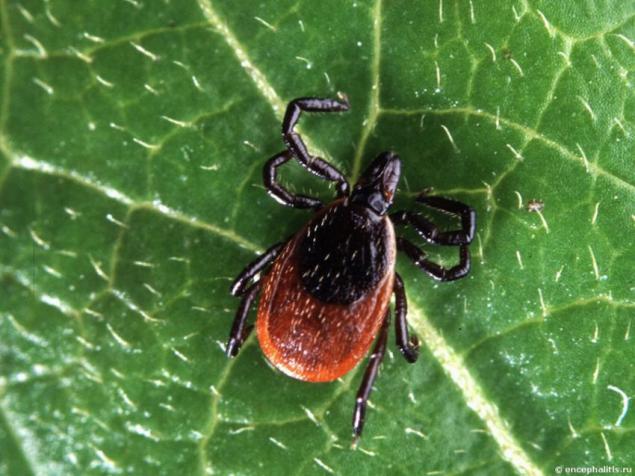
Encephalitis
Encephalitis - the most terrible disease transmitted by ticks. If you're lucky - get off fear, and if not - possible paralysis of both arms, blindness or deafness. Keep in mind, these effects are irreversible, unless, of course, does not soon come up with some kind of universal treatment. But while it is not. In some cases, encephalitis resulting in death of the victim.
Worst of all, if you are bitten by a carrier of encephalitis in Siberia or the Far East, as the mites spread in these parts is particularly severe form of the disease, and according to statistics from her dying bitten 80 out of 100. In Europe a little easier out of 100 infected die just two, but and this is a reason to worry about his health, does not it?
By the way, if people have already suffered one encephalitis, then it gets him lifetime immunity.

Borreliosis
The second dangerous disease - Lyme disease. It is characterized by fever and redness at the vast site of the bite. When complications arise paralysis of facial muscles on the joints begin to ache, and in severe cases the pain can be so severe that it becomes impossible to move. There may be problems with hearing and eyesight, up to a total loss, or heart problems. The skin becomes thin, dry and acquire bluish tint.
A worst-that vaccination against borreliosis exists. Immunity, too - if you hurt one time, you can get sick and second. Fortunately, in the early stages it is fairly easy to cure, but it should be time to turn to the doctor.
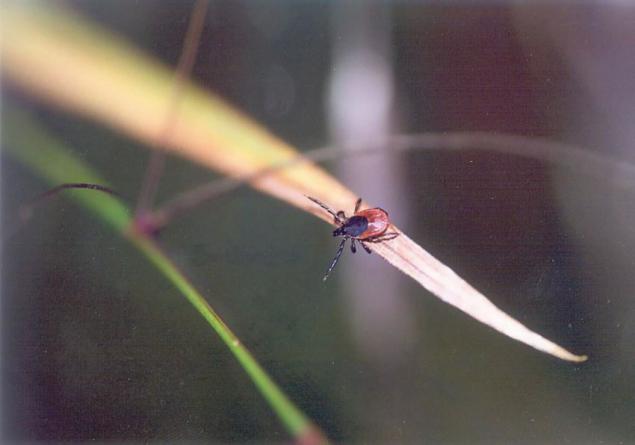
Removing the tick
If you are lucky and you still found myself glaring at the body of the tick, the First - do not panic. Remember that in any critical situation it is necessary to keep cool.
To begin with remove the tick. This should be done very carefully, preferably with tweezers, turning it counterclockwise. In no case do not dёrgayte mite - he had already grabbed your flesh front paws and if the pull strongly come off his head, and she with stinger remains in the skin. Then you have to pick out the head of a needle, pre-baked in the flames of lighters, like a splinter. If, however, remain at least sting, you have to be eventually cut it with a scalpel. In the case of tweezers with you there, you can try to unscrew the insect with a loop of thread.
It is often said about the process of removing the tick using vegetable oil - supposedly the insect begins to choke and will come out by itself. Doctors do not recommend. Choking something really starts to tick, but in this case, your blood will release the maximum amount of saliva because it will start to feel sick much, but, as we remember, is contained in saliva and pathogens.
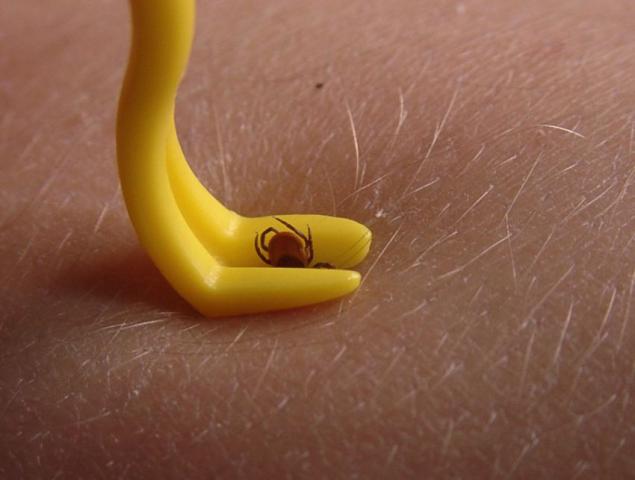
The proboscis and legs
Once extracted tick, carefully inspect it for the presence of all the parts - the number of legs (feet indistinguishable from the proboscis) must be odd. If an even - so the sting is left in the body, and an urgent need to address the emergency room to remove it, and at the same time to make a shot. Remember that a shot will have to do anyway, and try not to delay this.
Do not forget to put a tick in the box checkout to take on the analysis of the SES in the next lab.
Within 10 days after being bitten you will need to donate blood for infections. Doing this also necessary in any case. More in two weeks - a reanalysis of already immunoglobulin M encephalitis, and in another one - in the immunoglobulin M to borreliosis. Of course, this you must tell the doctor, but it is better to know about it themselves: who warned - that is armed.
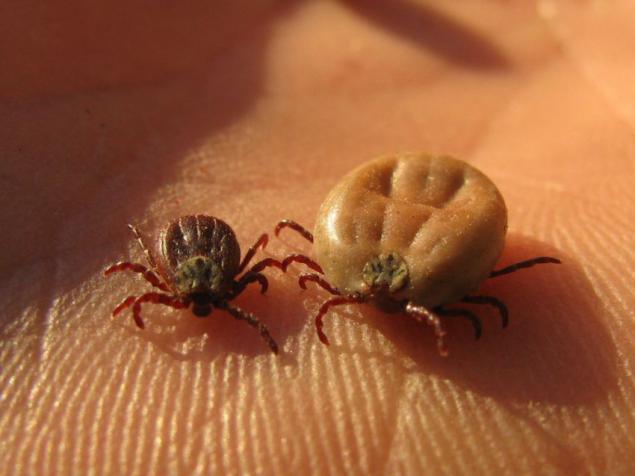
Source: www.publy.ru

Ticks do not climb trees and jump out of the grass.
The most common ticks bite a man in the forest - where they actually live.
The mite can crawl on you from the grass or shrubs, but do not jump from the tree because ticks can not jump. Usually, they do not rise above 1, 5 m above the ground. The legs are very tenacious insects, arachnids and themselves - are very small, so you do not even feel that someone crawling through your body. Of course, avoid contact with ticks can help tight-fitting clothes, but only rely on is not worth it. Usually mites bite in the softest place on the body - armpits, groin area or behind the ears. Therefore, walking through the woods, often examine themselves and friends.
Do not forget that you can pick up the infection not only directly through the bite of an insect. You can also become infected by drinking milk is not boiled - mites do not care who is in front of them, human or animal, so they are happy to bite cows. Nursing mothers, incidentally, also need to beware, and while a terrible diagnosis is not refuted, not breast feed your baby. But the other way from person to person Encephalitis is not transmitted, and catch from friends does not threaten you.

Vaccination
Ideally, before you go in the country, need to be vaccinated against the most common diseases that spread the mites - encephalitis. However, do they need to be in February, otherwise there is a risk that the vaccine will not act. Usually put three injections with an interval, and is that the vaccine - the most effective means of protection. Note that vaccination should take place every year.

Infections
In general, a lot of tick-borne infections, and encephalitis and Lyme disease - the most serious and dangerous of them. However, there is still granutsitarny anaplasmosis, ehrlichiosis monocyte, babesiosis, typhus and others. Infection is transmitted directly to the person during the bite with saliva injected into the body. Of course, there are also so-called "clean" ticks in the saliva which does not contain any infections, but guarantee that a tick bite you is not a carrier of the disease, no.

Encephalitis
Encephalitis - the most terrible disease transmitted by ticks. If you're lucky - get off fear, and if not - possible paralysis of both arms, blindness or deafness. Keep in mind, these effects are irreversible, unless, of course, does not soon come up with some kind of universal treatment. But while it is not. In some cases, encephalitis resulting in death of the victim.
Worst of all, if you are bitten by a carrier of encephalitis in Siberia or the Far East, as the mites spread in these parts is particularly severe form of the disease, and according to statistics from her dying bitten 80 out of 100. In Europe a little easier out of 100 infected die just two, but and this is a reason to worry about his health, does not it?
By the way, if people have already suffered one encephalitis, then it gets him lifetime immunity.

Borreliosis
The second dangerous disease - Lyme disease. It is characterized by fever and redness at the vast site of the bite. When complications arise paralysis of facial muscles on the joints begin to ache, and in severe cases the pain can be so severe that it becomes impossible to move. There may be problems with hearing and eyesight, up to a total loss, or heart problems. The skin becomes thin, dry and acquire bluish tint.
A worst-that vaccination against borreliosis exists. Immunity, too - if you hurt one time, you can get sick and second. Fortunately, in the early stages it is fairly easy to cure, but it should be time to turn to the doctor.

Removing the tick
If you are lucky and you still found myself glaring at the body of the tick, the First - do not panic. Remember that in any critical situation it is necessary to keep cool.
To begin with remove the tick. This should be done very carefully, preferably with tweezers, turning it counterclockwise. In no case do not dёrgayte mite - he had already grabbed your flesh front paws and if the pull strongly come off his head, and she with stinger remains in the skin. Then you have to pick out the head of a needle, pre-baked in the flames of lighters, like a splinter. If, however, remain at least sting, you have to be eventually cut it with a scalpel. In the case of tweezers with you there, you can try to unscrew the insect with a loop of thread.
It is often said about the process of removing the tick using vegetable oil - supposedly the insect begins to choke and will come out by itself. Doctors do not recommend. Choking something really starts to tick, but in this case, your blood will release the maximum amount of saliva because it will start to feel sick much, but, as we remember, is contained in saliva and pathogens.

The proboscis and legs
Once extracted tick, carefully inspect it for the presence of all the parts - the number of legs (feet indistinguishable from the proboscis) must be odd. If an even - so the sting is left in the body, and an urgent need to address the emergency room to remove it, and at the same time to make a shot. Remember that a shot will have to do anyway, and try not to delay this.
Do not forget to put a tick in the box checkout to take on the analysis of the SES in the next lab.
Within 10 days after being bitten you will need to donate blood for infections. Doing this also necessary in any case. More in two weeks - a reanalysis of already immunoglobulin M encephalitis, and in another one - in the immunoglobulin M to borreliosis. Of course, this you must tell the doctor, but it is better to know about it themselves: who warned - that is armed.

Source: www.publy.ru












